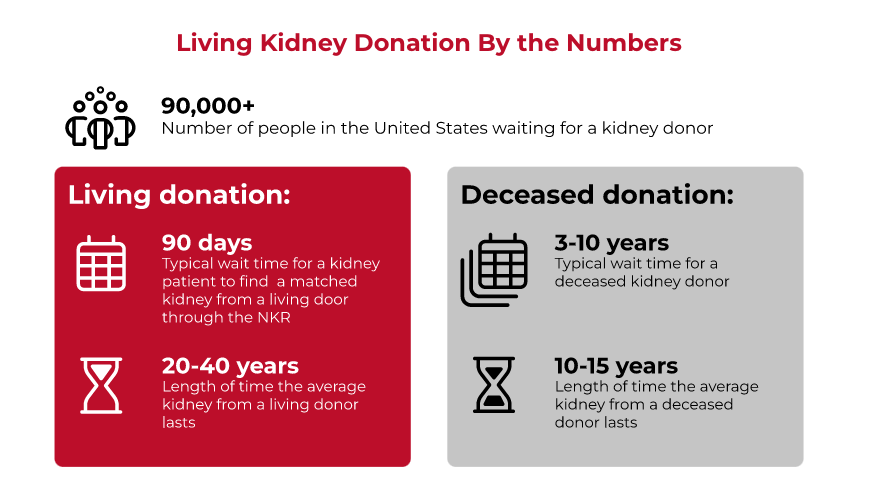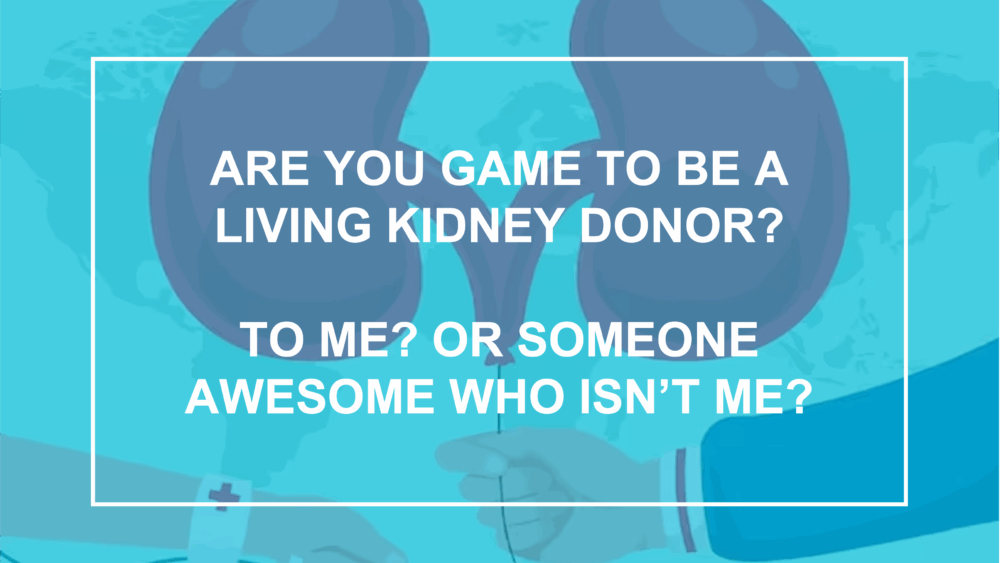Are You Game to be a Living Kidney Donor? To me? Or someone awesome who isn’t me?
Backstory: I wrote this blog post a year ago and shared it with a colleague for input. But I wasn’t going to share it more broadly…yet. It’s not quite time for me. Then last week, that colleague let me know that she has entered the testing process for being a living kidney donor. If she qualifies, she intends to give a voucher to me for the future. It’s a long process, but I was so touched by this, and if it works, someone, or many people, will benefit.
When I mentioned to her that I wasn’t going to publish the post yet, she said: “I want to note that I started thinking about donating when you originally penned the blog post a year ago. The point you made in the blog post — that the more people who know that it is possible to donate a kidney, the more likely people will be to do it — proved true. Your post was effective with 100% of the audience it reached (me!). So, I’d like you to consider if now is actually the right time for the blog post. It can lay a foundation for you and it might get the gears turning in someone else’s head.”
When my colleague blew my mind telling me she had started this process, she said:
“Things feel dark right now. This is something I could do to add some light.”
So here goes:
******************************
About one year ago, I had some alarming news from a relatively routine blood test. My kidney function, which has been stable to slow-decline for most of the 38 years I’ve known about my polycystic kidney disease, took a nosedive. I wasn’t in crisis, but the reasonable stability in this chronic condition seemed to be done. My hopes of avoiding a need for kidney replacement therapy (dialysis or transplant) were likely over.
I have had a lifetime relationship with kidney disease and with the ancillary health conditions that often accompany this condition. Polycystic kidney disease (PKD) afflicts 500,000 people in the US, and that includes my late father, my late aunt, my brother, at least one niece, and many cousins. It is a genetic mutation that can impact many members of the same family. With this disease, your kidneys grow progressively less effective over your life due to an accretion of cysts. Some people never need to address the disease. Some people lose kidney function in their thirties. It’s luck, physical health, and likely a wealth of factors we don’t yet understand. You can read more here.
Because my dad had two kidney transplants from deceased donors and my brother received a transplant from a living donor (a complete stranger who heard about him on Facebook), I have spent some time thinking about the issue of living kidney donation.
The dynamics of the situation in the US (I’ll address just that here) are interesting. There are between 90,000 and 100,000 people in the US who need a kidney transplant. The availability of cadaver donations has decreased some because of a reduction in traffic fatalities. The waitlist to get a cadaver kidney can be years – often too long for the person who needs it. Dialysis offers some respite, but most people view the effects of dialysis as a slow death sentence, and the lifespan data supports that view (leaving aside the 3-4 days per week one needs to be lying in a bed to receive the treatment).
The National Kidney Registry offers this very sexy graphic to show how valuable a kidney donation from a living person is:

I got so excited about the prospect of resolving the “list” with living donors that I gave an Ignite Talk on the topic. That talk led to now-friend Patty Graham making a non-directed living donation (donating a kidney without designating a recipient). It’s worth noting that only about 175 people in the US donate as “Non-directed Donors (NDDs)” every year. But an NDD often opens up the possibility of a chain of 3 to 12 people who receive a donation on the same day! You can see an incredible documentary of an altruistic kidney donation in “Confessions of a Good Samaritan,” fabulously now streaming on Netflix.
Patty, my brother’s donor, and so many other living donors I’ve met say the decision of donating a kidney has been one of, if not the best things they’ve done in their life. Patty and many others work full-time counseling prospective donors, working their tails off to eliminate the list. Groups like Waitlist Zero, Kidney Donor Athletes, and the National Kidney Donation Organization are comprised of leaders who have transitioned away from their careers to work on this issue full-time. The thought is that the more people who know you CAN donate a kidney in life without major health repercussions, the more people WILL take this action.
As I’ve thought about my likely near-term-future need for a donor, I have felt shy about asking people to consider donation because I have a personal interest. I will likely need a kidney in the next 1-2 years. I didn’t need one when I gave that 5-minute Ignite talk. I felt it was unfair to ask people to give something to ME. I fretted about making others uncomfortable with this ask.
And then I realized that the fact that I likely will need a living kidney donor may make me the PERFECT person to ask MORE people to consider making a living donation of their spare kidney (most data suggest you only need one working kidney to live well as a human).
Here’s the thing. I know people. I have some resources to take time to work on this issue. I know how to build a simple website to share the details of my case. I am better positioned to ask for and potentially secure this life-saving gift than many of the 100,000 people on the list.
The palm-on-forehead thought was this: if I can garner interest from one person in donating a kidney to me, perhaps I could garner interest of 100 people in donating a kidney in general. If I could achieve that, and if I assume that every non-directed donation generates between 3 and 12 successful transplants via donor chains, my ask alone could have a meaningful impact on the 100,000-person list.
In speaking with a friend, she mentioned that she’d be most motivated by donating to me. However, once she heard about the chance to save multiple lives through a non-directed donation, in her words, “that really alters the math for me.”
I recently learned that a friend in Boulder heard about kidney donation, started the process via the National Kidney Registry, and donated as an NDD within months.
I told him of my ambivalence about asking people to consider donating a kidney to me. Here is what he said:
“If the time arises for you to ask a donor I hope that you can keep in mind an insight of Santideva, a sixth century Buddhist Philosopher and poet:
IN GENEROSITY THE REAL GIFT IS TO THE GIVER!!!!!!!!!!!!
Think of the time that you gave someone you love the perfect gift. Was it not a joyful gift for you as well? By asking you provide the opportunity for another being to give the perfect gift!
I feel so blessed to have been able to help a little bit. Donation has provided me a wonderful opportunity to expand my experience of this life. Your ask will allow someone else to feel that same …..and the reality is it just isn’t that big a deal for the donor. I am 3 weeks out, healing nicely, and will be on skis by January.”
So, I’m not quite ready to ask. I am still doing okay, teetering a bit, but not in the transplant search flow yet.
However, I have these other few things to share with you.
One, if you enter the flow through NKR, you can offer a voucher for future kidney eligibility to a person you care about who may need it or a group you care about (fire department, school staff, etc). If a need arises in that person or that group, they will rise to the top of the list for that all-important living donor.
Two, if you enter the flow through NKR, you are protected by “Donor Shield.” You should have little to no out-of-pocket expenses. If you need a kidney in the future, you will be protected, and you will have avid, loving coaching through the process from a previous donor.
Three, according to the research of Dr. Abigail Marsh at Georgetown, and my personal experience, when this message reaches the right person, living kidney donations happen. Perhaps that’s you. If it is, go for it. If you want to talk to me, find me at HeySue.com. If you want to talk to other donors, I’ll make those connections.
When I’m personally in need, I will do all of the things, and you will know it, and I will appreciate you giving that a thought if you choose to at that time. For now, know that there are 100,000 people in need. Sharing this post may make a difference if it feels right to you.
With so much love,
Sue
Thoughts, reactions, blurts? Share them here.


